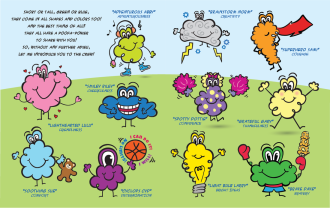Former Mountain Xpress graphic designer Kerry Bober began work on her newest project, a children’s book, after playing with her young niece, who jokingly called her dad a “poofa.” Giggling at the term, Bober went to her sketchbook to experiment with some drawings of what a “poofa” might look like. Before she knew it, Bober had created Poofas, the positive thought bubbles that cartwheel and leap through her new book, POOFAS: Popping in to Lend a Hand!
“The story began to come to life with the characters,” says Bober, who eventually created 11 individual Poofas, each with its own “Poofa power,” such as confidence, bravery, friendliness or creativity. “My hope was that kids who read the book could imagine their favorite Poofa character popping in for support and encouragement when they encounter adversity. Eventually, they would find these ‘Poofa powers’ within themselves.” With the help of Kelsey Latimer, pediatric psychologist and Bober’s longtime friend, this hope became a reality. Latimer’s advice and clinical knowledge helped Bober to realize the Poofas not only as positive thought bubbles but also as therapeutic aids.
“The Poofas help kids to identify their thoughts, enabling them to have an external point of view and to feel a sense of empowerment in controlling their thoughts,” says Latimer. “In clinical terms, we call this the difference between internal and external locus of control and the method for identifying it cognitive reframing.” This is where the book’s interactive format comes in.
POOFAS is divided into sections that give profiles of individual Poofa characters and stories of children who use them. Following these mini-stories are the “Pick-A-Poofa” sections, in which readers can identify and choose different “Poofa powers” they would use in the same situation. Bober, who worked closely with children, including her niece, in the creation of the book, notes that “the kids love the section where they can Pick-A-Poofa. It gives them a chance to use their imagination and puts them in a place to be heard. … They seem to really light up with excitement when they talk about [which character] they would choose and why or how they would use them in a situation of adversity.”
At the end, there is a space provided for kids to write their own Poofa stories. “Kids are loving using their imagination and feeling they are a part of something with the Poofas,” says Bober. “For Kelsey and me, it was really a way to let kids practice using the characters in their everyday life. It is said when we write something, we learn it a lot faster, so we thought this would be fun and a great learning tool for the children.”
Reminiscent of Richard Hargreaves’s midcentury “Mr. Men Little Miss” books but with a contemporary awareness of psychology and social identity, Bober’s and Latimer’s colorful book is not only important but delightful for both kids and their parents.
At a book launch party on Sunday, Nov. 20, there will be T-shirt giveaways, and kids will have a chance to listen to the story, get their pictures taken with cut-outs of some of the characters, write and illustrate their own Poofa stories and enjoy character coloring pages. For more information, go to firestorm.coop/events and poofas.com.
WHAT: POOFAS book launch party
WHERE: Firestorm Books, 610 Haywood Road
WHEN: Sunday Nov. 20, 11 a.m.-1 p.m.





The stress described sounds more like it belongs to the parents (projection much?), but at least the kids are reading, which is the end goal worth aspiring to.
Sadly, adults don’t read books to relieve stress- it’s pharmies, booze, video games, vapid social media and dead end relationships in America.
Huxley called it ‘soma’.
Obviously times have changed for a few decades, but ‘stress’ as a child for me was ‘How can I get out of the house to run around in the woods with my friends and avoid doing chores before being called for dinner?’. Playing outside was the antidote.